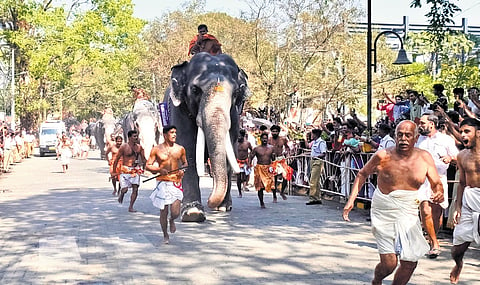

KOLLAM: Elephants have long been the central attraction of Kerala’s religious festivals, but the rising number of deaths from jumbo attacks is alarming. In 2024, nine people were killed in such incidents. However, in just the past three months of 2025, seven fatalities have already been recorded, according to police records.
In Kozhikode’s Koyilandy, three people were killed in a single incident, while Thrissur reported two deaths. One person each died in Malappuram and Palakkad districts. In 2023, 11 people were killed in similar attacks.
Veterinary experts warn that the continuous use of elephants in festival processions is a major factor behind these incidents. Captive elephants experience a surge in testosterone levels between January and March—coinciding with the festival season—making them more prone to aggression. Inadequate food, water shortages and loud music further aggravate their distress.
"What we have seen in captive elephants is that their testosterone levels rise to 15–20 during this period, compared to the safe range of 5–8. This leads to secretions from the temporal gland, signalling heightened aggression. Ideally, elephants should receive rest and care during this time, but instead, they are subjected to noisy festivals with DJ music and firecrackers. The stress makes them want to escape the environment," said Dr D Shine Kumar, Chief Veterinary Officer, Kollam.
"Moreover, elephants often don’t get their preferred food. While some enjoy coconut leaves, other elephants may favour bananas. Plus, water shortages and lack of rest can cause gastric issues, leading to aggressive behaviour," he added.
Animal rights activists also highlight violations of regulations meant to protect elephants.
"Elephants are frequently prodded during festivals, blatantly flouting the rules," said VK Venkitachalam, Secretary of the Heritage Animal Task Force.
"As per regulations, elephants should not be paraded for more than six hours at a stretch. If an elephant is paraded one night, it should not be paraded the next day. They should not be transported between 11 a.m. and 4 p.m., and no more than three elephants should enter temple premises at a time. The High Court has also mandated that devotees maintain a one-metre distance from the elephant during festivals. Yet, these rules are repeatedly ignored because the government fails to enforce them, and the public does not object. As a result, violent incidents will continue," he said.
Meanwhile, Forest Minister AK Sasheendran has assured that steps will be taken to curb such incidents.
"The government, along with the Devaswom Board, will take strict action against those violating regulations. A district-level monitoring system is already in place, and enforcement will be further strengthened in the coming days," the minister said.